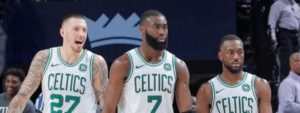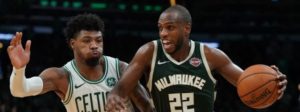Celtics roster assessment reflect
It’s hard for NBA players to think too much about where they are now in the middle, reflect upon but when you get near the first quarter mark of the season, that’s usually a good time to assess where a team stands.

They’ve played enough games to where you have a legit sample size to work with, and still leave plenty of games – and potential opportunities to improve – still ahead.
So here at NBC Sports Boston, we take a dive into the Celtics’ season 19 games in with the focus on what has worked, what hasn’t worked and what’s a work in progress thus far.
We didn’t know what to expect with Kemba Walker being brought in to replace Kyrie Irving. He is scoring fewer points (21.6 points per game) than usual, but his leadership and ability to keep the locker room connected have been huge factors in Boston’s early season success.
Marcus Smart has been shooting and scoring at a career level, in addition to showcasing an expanded game defensively that involves him on some nights guarding all five positions. A recent injury suffered in Boston’s 113-104 win over New York raises some concerns as to whether he’ll be available to play in the short-term.
Jaylen Brown and Jayson Tatum have been tremendous for the Celtics this season, showing the kind of potential that has made Danny Ainge offer up a “thanks but no thanks” to the inquiries made for the two players in the past. Not only have they been huge in fueling Boston’s success this season, but both are playing their way into the conversation of being first-time All-Stars this season.
The center position has been by committee, although Daniel Theis has stood out as the best of the litter. With him in the starting lineup, the Celtics have a legit rim-runner who can also do a solid job defensively in man-to-man coverage as well as on switches.
A lot of Boston’s success rides on how well they play and score. Through the first 18 games, Boston’s starters are averaging 83.3 points, which is tops in the Eastern Conference (third overall) according to Hoopsstats.com.
This has been a much-maligned group all season for what has been a two-fold problem: their lack of scoring and their overall lack of impact on many games. Part of the problem has been the constant state of influx for the second unit because of injuries.
Gordon Hayward has missed nearly a month of the season due to a left hand injury, which thrust Marcus Smart back into the starting lineup. Jayson Tatum is the only starter to appear in all 19 games for Boston (14-5), which means a second-unit regular has been in the starting lineup pretty much all season.
That said, we are starting to see signs of life from this second unit being capable of more than just biding time until the first unit returns. Brad Wanamaker has been a steadying presence on the floor as a backup point guard. Enes Kanter is a scoring/offensive rebounding machine for Boston, evident by his double-double of 11 points and 11 rebounds in Boston’s 113-104 win at New York on Sunday.
Robert Williams III and Grant Williams (no relation) continue to show improvement in terms of impacting the game in many ways while not necessarily having the big-time stats to back it up.
It has been a rollercoaster of sorts for the Boston Celtics and their sometimes-but-not-always really good defense. The Celtics have a defensive rating of 103.4 which ranks sixth in the NBA. But the last four games, Boston’s defensive rating is 108.6 and ranks 16th in the league during that span. One of the biggest factors that has hurt Boston’s defense lately is simply not defending more shots at the rim.
According to NBA.com/stats, Boston ranks fifth in field goal percentage defense (.433) for the season. But for the last four games, that number rises to .459, which is 19th overall in that span.
Defensive rebounding has also become a bigger issue of late for Boston. For the season, Boston’s defensive rebounding percentage (.720) ranks 22nd in the NBA. But in the last four games, that number drops to .697, which is 26th overall in that span.
And then there are turnovers which have led to far too many possessions in which teams can attack Boston’s defense in transition. The Celtics are averaging a league-low 13.2 turnovers per game. In the last four games, Boston ranks 17th with a 14.8 turnover per game average.
Improving in any one of the aforementioned areas will go far in Boston’s quest to improve a defense that has struggled recently.
The addition of Kemba Walker has created more of a buckets-by-committee approach to the offense which is doing about the same statistically as last year’s group. However, the way Boston has gone about generating offense is why there’s hope that the Celtics offense will continue to get better as the season progresses.

Boston currently has an offensive rating of 109.6 which ranks 11th in the league. A year ago, Boston’s offensive rating was 111.3 and ranked 10th in the league. As pointed out earlier, the biggest difference is that the Celtics aren’t as dependent on one scorer (Kyrie Irving) to generate the lion’s share of the offense.
Boston is currently ninth in the NBA on drives (47.8) per game, a major bump up compared to a year ago when they averaged 38.4 drives, which ranked 27th in the league. Boston has four players (Kemba Walker, Gordon Hayward, Jayson Tatum, and Jaylen Brown) each averaging at least nine drives per game compared to last season when Kyrie Irving was the only one who exceeded that threshold. Boston’s multi-faceted attack offensively was on display in Boston’s most recent game, a 113-104 win at New York.
Tatum led all players with 30 points, six rebounds and a career-high seven assists. But in the fourth quarter, it was Brown taking over for large chunks of the quarter, finishing with 28 points. And then there was Kemba Walker, who tallied his first double-double as a Celtic with 16 points and 10 assists to go with five rebounds. Boston also got double-digit scoring performances off the bench with Enes Kanter and Brad Wanamaker each tallying 11 points.
Having that kind of depth is at the heart of why Boston’s offense has been pretty good, with the potential to be significantly better going forward.
Brad Stevens gets lots of props for his in-game adjustments, ATOs (After Time-Outs) and stuff like that. But the area where he has shown tremendous growth this season is handling all the different egos, goals and expectations that players on this team have for themselves as well as the team as a whole.
It’s a lot easier for players to buy into the notion of constantly wanting to grow when they see that happening with their head coach. The way Stevens has dealt with the playing time conundrum from the very start of the season has been a low-key, key to their success. Enes Kanter probably isn’t playing as much as he would have hoped, but that’s because the guy in the starting lineup, Daniel Theis, has outplayed his big man teammates and has earned the right to be on the floor, without question.
Putting players in the best position to be their best is at the heart of what Stevens tries to do on a day-in, day-out basis. And as we’ve seen more times than not this season, Stevens is pushing all the right buttons.



